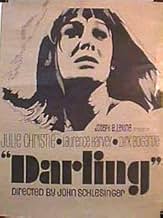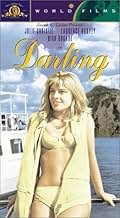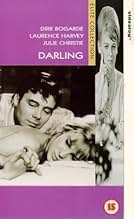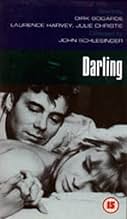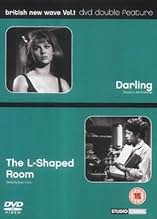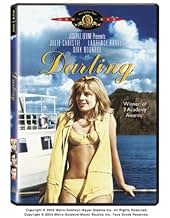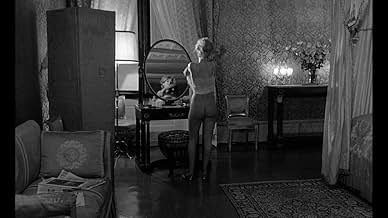IMDb-BEWERTUNG
7,0/10
8382
IHRE BEWERTUNG
Füge eine Handlung in deiner Sprache hinzuBeautiful but amoral model Diana Scott sleeps her way to the top of the London fashion scene at the height of the Swinging Sixties.Beautiful but amoral model Diana Scott sleeps her way to the top of the London fashion scene at the height of the Swinging Sixties.Beautiful but amoral model Diana Scott sleeps her way to the top of the London fashion scene at the height of the Swinging Sixties.
- 3 Oscars gewonnen
- 17 Gewinne & 8 Nominierungen insgesamt
José Luis de Vilallonga
- Prince Cesare della Romita
- (as Jose Luis De Vilallonga)
T.R. Bowen
- Tony Bridges
- (as Trevor Bowen)
Empfohlene Bewertungen
What a delight. Possibly the best of the British New Wave and one of the finest British films of all time. The story follows Julie Christie's rise up the social ladder by a succession of affairs and social posturing she's infuriating, but you can't resent her behaviour, she is so natural and full of joie de vivre impossible to keep in a cage. She first appears walking along the street swinging her handbag the same entrance as she made in "Billy Liar" and surely an indication that we are dealing with essentially the same character. Bogarde, a television journalist, is the first man she takes up with, and is as serious as she is reckless, yet somehow they are well-suited and their relationship, with some painfully familiar ups and downs, is touching.
The emotional core of the film is Bogarde and Christie's visit to an old writer. This, her first step up the social ladder, gives her the thrill of being somewhere, doing something. It is also a gently melancholy and thoughtful scene. Humour and emotion come in equal measure throughout, and every exchange crackles with meaning:
Christie: "You used me!" Bogarde: "You used me. It's a moot point."
Christie really earned her Oscar for this. Her performance is full of humour and irony, but she's mainly being herself and she has a genuine sensitivity and humanity that lifts you and carries you along. Only some slightly flippant scenes with her photographer friend (especially the shoplifting scene which was too much like "Breakfast at Tiffanys") were a little out of alignment. But Schlesinger does special things throughout. Every scene is like a little self-contained story, so sharply done you can almost hear a snap at the beginning and end as it falls into place.
This is a big film, almost as big as "La Dolce Vita" which it sometimes echoes - better, perhaps, on account of the razor sharp script by Frederic Raphael which is so accomplished, smooth, intelligent, witty and ironic that it has an almost poetic quality while still being thoroughly down-to-earth. The ending is unexpectedly downbeat, and doesn't feel like the real end, just a line they had to draw somewhere - which is perhaps what the film really was all about: the lines that we have to draw at certain points in our lives that rule some things in, other things out, that enable us to go on, for better or worse. Really splendid stuff.
The emotional core of the film is Bogarde and Christie's visit to an old writer. This, her first step up the social ladder, gives her the thrill of being somewhere, doing something. It is also a gently melancholy and thoughtful scene. Humour and emotion come in equal measure throughout, and every exchange crackles with meaning:
Christie: "You used me!" Bogarde: "You used me. It's a moot point."
Christie really earned her Oscar for this. Her performance is full of humour and irony, but she's mainly being herself and she has a genuine sensitivity and humanity that lifts you and carries you along. Only some slightly flippant scenes with her photographer friend (especially the shoplifting scene which was too much like "Breakfast at Tiffanys") were a little out of alignment. But Schlesinger does special things throughout. Every scene is like a little self-contained story, so sharply done you can almost hear a snap at the beginning and end as it falls into place.
This is a big film, almost as big as "La Dolce Vita" which it sometimes echoes - better, perhaps, on account of the razor sharp script by Frederic Raphael which is so accomplished, smooth, intelligent, witty and ironic that it has an almost poetic quality while still being thoroughly down-to-earth. The ending is unexpectedly downbeat, and doesn't feel like the real end, just a line they had to draw somewhere - which is perhaps what the film really was all about: the lines that we have to draw at certain points in our lives that rule some things in, other things out, that enable us to go on, for better or worse. Really splendid stuff.
This is a breakthrough film depicting what a female with a fairy tale-like upbringing experiences when she gets into the real world. Julie Christie is magnificent as the free-spirited, swinging role model for women everywhere. She has men falling right and left for her and even promises of wealth beyond imagination. But her unfulfilment is perfectly depicted in this daring and innovative film. She falls for a famous dashing tele-journalist, but realises soon enough that she is no match for his brain. She falls for a slick and smarmy executive, hoping to find her place with the jet set. She sees the shallowness of that existence soon enough! She does eventually find some taste of fame and is swept away to Capri, one of the most romantic and beautiful spots in the world. But there she sees only the shallow reflection of her outer beauty when confronted with the deeper beauty of elderly women praying with grace and humility at a local church. She does also manage to meet a prince who wants to marry her. He gives her wealth, a title, an enormous glamourous estate, a tailor-made family (from a previous marriage) and his deepest admiration. Unfortunately, his admiration is no more deep for her than it might be for his prize horse or Rolls Royce. She has everything but love.
The film has much to say about the illusions of glamour that women are compelled to fulfil. They are compelled to fulfil those illusions because they never had an inkling that there could be anything else. Women could rub shoulders (and other body parts) with men of brilliance, of power, and of wealth, but their own surface existence could never be a match. The film is essentially a tragi-comedy, for beneath the delightful exterior of the film is the harsh reality that a surface life is no match for a life with purpose.
This film is also amazing because it is one of the few films that actually shows characters living in a real world, not just a world that revolves around the characters. Schlesinger fills the screen with a myriad of realities. The man on the street pontificating his views on city life, a famous author, celebrities, bohemians, a gay photographer who is not traumatised about what he is, and even that great symbol of solid innocence - the elderly woman feeding the pigeons at Picadilly Circus, they are all essentially equal in importance. We in fact are mainly introduced to Christie's character as she is plucked out of the street in an indiscriminate interview. She is much a product of the world as anyone else.
The film is still timely today, since there are still so many women who cling to the images and myths of ideal womanhood (ie: an illusion without soul or intelligence). All the performances are smashing. And yes, it is true, that swinging sixties feel is irresistible!
The film has much to say about the illusions of glamour that women are compelled to fulfil. They are compelled to fulfil those illusions because they never had an inkling that there could be anything else. Women could rub shoulders (and other body parts) with men of brilliance, of power, and of wealth, but their own surface existence could never be a match. The film is essentially a tragi-comedy, for beneath the delightful exterior of the film is the harsh reality that a surface life is no match for a life with purpose.
This film is also amazing because it is one of the few films that actually shows characters living in a real world, not just a world that revolves around the characters. Schlesinger fills the screen with a myriad of realities. The man on the street pontificating his views on city life, a famous author, celebrities, bohemians, a gay photographer who is not traumatised about what he is, and even that great symbol of solid innocence - the elderly woman feeding the pigeons at Picadilly Circus, they are all essentially equal in importance. We in fact are mainly introduced to Christie's character as she is plucked out of the street in an indiscriminate interview. She is much a product of the world as anyone else.
The film is still timely today, since there are still so many women who cling to the images and myths of ideal womanhood (ie: an illusion without soul or intelligence). All the performances are smashing. And yes, it is true, that swinging sixties feel is irresistible!
To see this 60's landmark film is quite something. In many ways could be considered a period piece and at the same time it could have been conceived yesterday. Julie Christie's performance is the insurance "Darling" has to ensure its powerful sailing through the years into the forever ever. She is extraordinary! Schlesinger lets himself be guided by something other than his British restrain and fear of sentimentality here. He is tough and poetic telling us the story of Diana Scott (could had been Lady Diana Spencer to a T) with understanding and compassion but without trying to make her a sympathetic character. Julie Christie takes care of that in what, time will tell, in fact is already telling us, one of the best performances on film, ever.
"Darling", as it happens with most genuine works of art, it grows, it develops over the years and acquires a sort of clarity that, with the benefit of hindsight I will dare to call it, prophetic, as a social observation of its time. But what matters most is the film as a film. Brilliantly thought, written, directed, photographed and, of course, acted. Julie Christie became a symbol. She, clearly a very intelligent woman, surfed the waves of fame with an apparent detachment that I'm sure it's a sure sign of maturity and of a great respect for her profession and herself. If you think I love Julie Christie, you're right. But my love for her has to do with "Darling" and the age I was when I first saw it. The 60's were already in the past then but I saw them in the future, an immediate future.I can't imagine anyone, from any age, who loves film could be indifferent to this tale of isolation in a world moving fast towards an acceptable cult for celebrity. Not to be missed.
I find this movie unique. If you have read of, or can remember the mid-1960s, you know that the character Julie Christie plays was absolutely the one adored by everyone- by all who considered themselves "in" and "trendy" and "modern". And she is completely taken apart by this movie.
I can think of only one other movie at any time in any language that so thoroughly demolishes the pretensions of the very people whom the smart set aspired to be at the time the movie was coming out. Amazingly that movie was 'Alfie', that came out about that same year. (A movie like La Dolce Vita is in a different mode - the people are the new meretricious post-war haute bourgeois class - a frequent target through history, and in that way, like The Ice Storm or Interiors or American Beauty as an attack on such values).
Virtually all "serious satires" take on targets that the "chattering classes" consider suspect - the hidebound, the hypocritical, the "authority figures" whom youth wish to overturn. Not this one. Astonishingly, in the midst of mod London, the very middle of the swinging 60s, you get a movie that looks at its non-committal "live for the moment" hedonistic experimentation and blasts its moral character with a cannon.
This just doesn't happen in movies - compare say, "If" or "O Lucky Man" or say, "Network" (to name three I like), and you'll see the targets as the familiar powers that be - from school to television. But Julie Christie's character is what people thought was new and wonderful - and its superficiality is blown to bits.
It's as if a movie now were to look at a poor black woman raising a child alone - and blast her for any behavior that contributed to this state. It just won't be done - the sympathies are all running FOR that character. So were the sympathies for the Julie Christie character in that time - and the movie is very very brave in running so utterly against the current.
I just love the movie - it's a step up from Schlesinger's earlier ones -the script is superb, the performances are excellent without exception. (Lawrence Harvey is particularly good - but of course it's Christie's movie).
Do see it. It's also full of wonderfully imaginative touches - such as the ending scene.
I can think of only one other movie at any time in any language that so thoroughly demolishes the pretensions of the very people whom the smart set aspired to be at the time the movie was coming out. Amazingly that movie was 'Alfie', that came out about that same year. (A movie like La Dolce Vita is in a different mode - the people are the new meretricious post-war haute bourgeois class - a frequent target through history, and in that way, like The Ice Storm or Interiors or American Beauty as an attack on such values).
Virtually all "serious satires" take on targets that the "chattering classes" consider suspect - the hidebound, the hypocritical, the "authority figures" whom youth wish to overturn. Not this one. Astonishingly, in the midst of mod London, the very middle of the swinging 60s, you get a movie that looks at its non-committal "live for the moment" hedonistic experimentation and blasts its moral character with a cannon.
This just doesn't happen in movies - compare say, "If" or "O Lucky Man" or say, "Network" (to name three I like), and you'll see the targets as the familiar powers that be - from school to television. But Julie Christie's character is what people thought was new and wonderful - and its superficiality is blown to bits.
It's as if a movie now were to look at a poor black woman raising a child alone - and blast her for any behavior that contributed to this state. It just won't be done - the sympathies are all running FOR that character. So were the sympathies for the Julie Christie character in that time - and the movie is very very brave in running so utterly against the current.
I just love the movie - it's a step up from Schlesinger's earlier ones -the script is superb, the performances are excellent without exception. (Lawrence Harvey is particularly good - but of course it's Christie's movie).
Do see it. It's also full of wonderfully imaginative touches - such as the ending scene.
Wusstest du schon
- WissenswertesThe "vox pop" TV interviews conducted by Dirk Bogarde's character with people in the street were all done with genuine members of the public, not actors, and were not scripted.
- PatzerWhen Diana and Robert quarrel and he leaves the apartment they share together, a microphone is visible on the left of the scene.
- Zitate
Diana Scott: Taxi!
Robert Gold: We're not taking a taxi.
Diana Scott: Why not?
Robert Gold: I don't take whores in taxis.
Diana Scott: What do mean?
Robert Gold: That's what you are isn't it? A little whore! Isn't it?
- Alternative VersionenThe original UK cinema version was cut by the the BBFC to remove shots of a man wearing a woman's corset and to heavily shorten a scene at a party in Paris where guests watch a couple making love on a hotel bed (the scene was edited to end the scene before the male partner appears). Video versions featured the same print though the cuts were later found and restored for the 2007 Optimum DVD release.
- VerbindungenFeatured in Film Review: Julie Christie & John Schlesinger (1967)
Top-Auswahl
Melde dich zum Bewerten an und greife auf die Watchlist für personalisierte Empfehlungen zu.
- How long is Darling?Powered by Alexa
Details
Box Office
- Budget
- 400.000 £ (geschätzt)
- Weltweiter Bruttoertrag
- 25.444 $
- Laufzeit2 Stunden 8 Minuten
- Farbe
Zu dieser Seite beitragen
Bearbeitung vorschlagen oder fehlenden Inhalt hinzufügen



